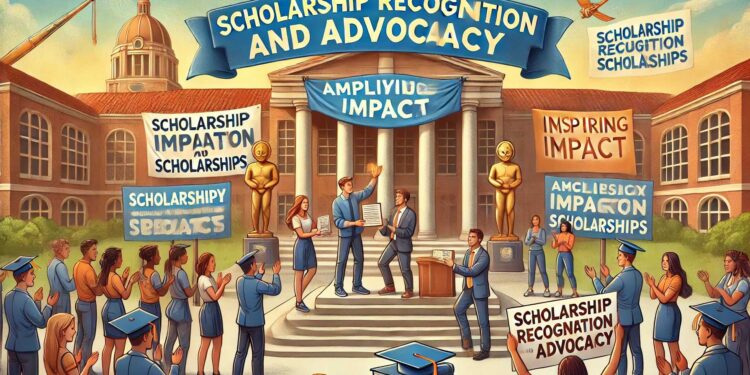Scholarships are powerful tools that not only provide financial support to students but also recognize their achievements and potential. However, the true impact of scholarships extends beyond individual recipients. Through scholarship recognition and advocacy, we can amplify the benefits, inspire broader societal change, and foster a culture that values education and equity. Let’s explore how recognizing scholarships and advocating for them can create a ripple effect, benefiting not just students but entire communities.
The Importance of Scholarship Recognition
Scholarship recognition refers to the acknowledgment and celebration of scholarship recipients and the organizations that provide these awards. This recognition is crucial for several reasons:
1. Validation and Motivation
Receiving a scholarship is a significant achievement that validates a student’s hard work, talents, and potential. Public recognition can boost recipients’ confidence and motivation, encouraging them to continue striving for excellence.
- Example: A student awarded a prestigious scholarship may feel a sense of validation that motivates them to pursue ambitious academic and career goals.
2. Role Models and Inspiration
Scholarship recipients often serve as role models within their communities. Their success stories can inspire other students to aim higher and apply for scholarships themselves.
- Example: A first-generation college student who receives a scholarship can inspire younger peers in their community to believe that higher education is attainable.
3. Visibility for Scholarship Programs
Recognizing scholarship programs helps to increase their visibility, attracting more applicants and potential donors. This can lead to the expansion of existing programs and the creation of new ones.
- Example: A local business that sponsors a scholarship may see increased community support and engagement as their contributions are publicly acknowledged.
Methods of Recognizing Scholarships
There are various ways to recognize and celebrate scholarships and their recipients:
1. Award Ceremonies
Hosting award ceremonies or recognition events provides a formal platform to honor scholarship recipients. These events can be organized by educational institutions, scholarship providers, or community organizations.
- Tip: Consider inviting local media to cover the event to increase visibility and community engagement.
2. Public Announcements
Announcing scholarship awards through press releases, social media, and school newsletters helps to publicly acknowledge recipients and raise awareness about the scholarship program.
- Tip: Share stories and testimonials from scholarship recipients to personalize the announcements and highlight the impact of the award.
3. Scholarship Plaques and Certificates
Providing recipients with plaques or certificates is a tangible way to recognize their achievements. Displaying these awards in schools or community centers can also inspire other students.
- Tip: Include details about the scholarship and its sponsors on the plaques or certificates to give credit to the donors.
4. Alumni Spotlights
Featuring scholarship recipients in alumni magazines, websites, or newsletters showcases their accomplishments and the role the scholarship played in their success.
- Tip: Highlight both recent recipients and those who have gone on to achieve significant milestones in their careers.
The Role of Advocacy in Scholarship Programs
Advocacy involves actively promoting and supporting scholarship programs to ensure their sustainability and expansion. Effective advocacy can lead to increased funding, greater public awareness, and enhanced policy support for scholarships.
1. Building Support Networks
Creating coalitions and networks of supporters, including alumni, educators, community leaders, and businesses, strengthens the advocacy efforts for scholarship programs.
- Example: An alumni association can advocate for the continuation and expansion of a scholarship program by organizing fundraising events and lobbying for support from local businesses.
2. Policy Advocacy
Engaging in policy advocacy involves working with policymakers to create favorable conditions for scholarship programs. This can include advocating for increased funding for education, tax incentives for donors, and policies that support access to higher education.
- Example: Advocating for state legislation that provides tax credits to businesses that contribute to scholarship funds can increase donations and expand the reach of scholarship programs.
3. Awareness Campaigns
Raising public awareness about the importance of scholarships and their impact on students and communities can garner broader support. This can be achieved through social media campaigns, public service announcements, and educational workshops.
- Example: A social media campaign that shares success stories of scholarship recipients and the positive impact on their lives can generate public interest and support.
Success Stories: Advocacy in Action
Effective scholarship advocacy has led to the creation and expansion of numerous impactful programs. Here are a few examples:
1. The Kalamazoo Promise
The Kalamazoo Promise is a pioneering scholarship program that provides full tuition to Kalamazoo Public School graduates attending any Michigan public college or university. This program was made possible through anonymous donations and robust community advocacy. The Promise has significantly increased college enrollment and completion rates among Kalamazoo students.
2. The Posse Foundation
The Posse Foundation identifies, recruits, and trains students from diverse backgrounds with leadership potential to form supportive, multicultural teams—posses—of 10 students. These students receive full-tuition leadership scholarships from Posse’s partner colleges and universities. Advocacy and partnerships have been crucial in securing funding and institutional support for the program.
3. Dream.us Scholarship Program
Dream.us provides scholarships to undocumented students who are DACA (Deferred Action for Childhood Arrivals) recipients. Advocacy efforts by immigration reform organizations and educational institutions have been instrumental in sustaining and growing this program, providing educational opportunities to students who otherwise face significant barriers.
Strategies for Effective Scholarship Advocacy
1. Engage Stakeholders
Involve a diverse group of stakeholders in your advocacy efforts, including students, educators, alumni, community leaders, and businesses. Their collective voices can amplify your message and lend credibility to your cause.
2. Leverage Data and Stories
Use data to highlight the impact of scholarship programs, such as increased college enrollment and graduation rates. Complement this with personal stories of scholarship recipients to illustrate the human impact behind the numbers.
3. Build Relationships with Policymakers
Establishing strong relationships with local, state, and federal policymakers can enhance your advocacy efforts. Regular communication, providing testimonies, and inviting policymakers to scholarship events can foster their support.
4. Sustain Momentum
Advocacy is an ongoing effort. Regularly update supporters on your progress, celebrate successes, and keep the momentum going with continuous outreach and engagement.
Conclusion: The Power of Recognition and Advocacy
Scholarship recognition and advocacy are essential components of maximizing the impact of scholarships. By publicly acknowledging scholarship recipients and the organizations that support them, we validate students’ efforts, inspire others, and increase visibility for scholarship programs. Through effective advocacy, we can secure the resources and policy support needed to sustain and expand these programs, ensuring that more students have access to the educational opportunities they deserve.
Together, recognition and advocacy create a powerful synergy that not only supports individual students but also fosters a culture that values education, equity, and community investment. As we celebrate the achievements of scholarship recipients and champion the cause of scholarship funding, we contribute to a more inclusive and equitable educational landscape for all.
















